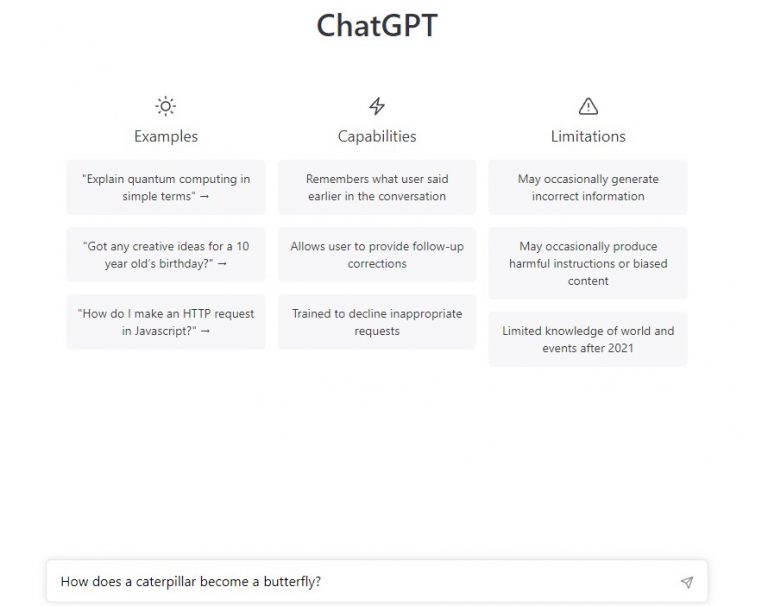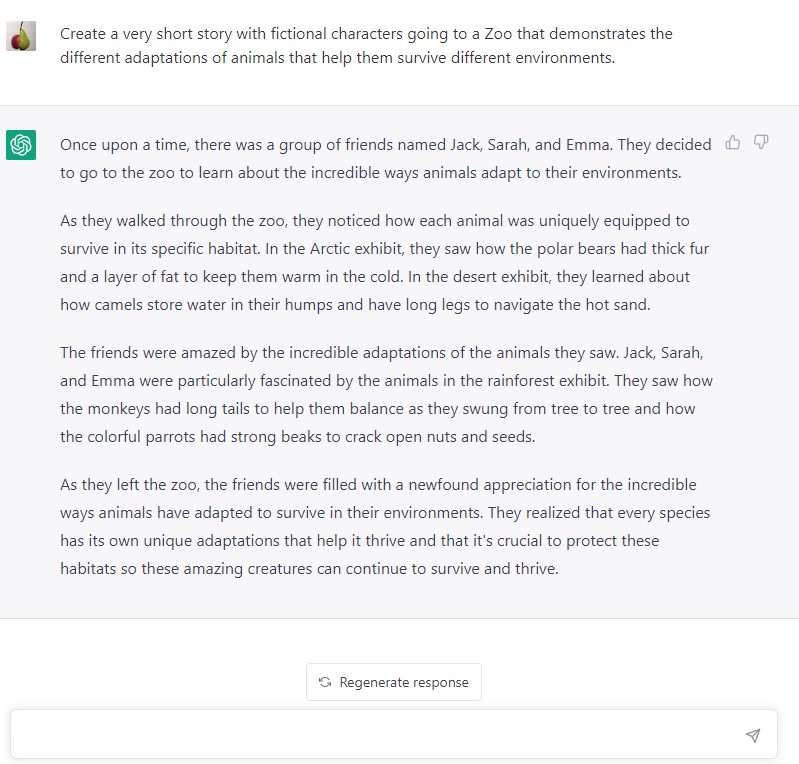ChatGPT, an AI language model, will impact students and teachers in 2023
What is ChatGPT?
ChatGPT is a cutting-edge AI language model that is designed to respond to natural language queries. It uses a deep neural network to process and analyse vast amounts of text data from the internet, providing accurate and relevant responses to any question it is asked. ChatGPT uses advanced AI algorithms to understand the context and intent behind each query, providing personalised and dynamic responses in real-time. And as of the time of this article being posted, it is free to access by the entire world.

Simply type in a question, or request, using natural, every-day language. ChatGPT will respond with an answer based on language models from all information it has accessed from the internet.

How Students Can Use ChatGPT
For students, ChatGPT offers a unique and engaging way to learn and study. Its intuitive interface and conversational style make it easy for students to ask questions and get answers in real-time. This can be particularly useful for students who are struggling to understand a particular concept or who need additional support outside of the classroom. Moreover, ChatGPT can be accessed from anywhere at any time (internet access permitting), making it an ideal tool for students who need to study on-the-go.
The downside for this is there is less stumbling in trying to find the answer – less “browsing” for the information. Remember when you used to open a dictionary to find a word? You could easily get sidetracked learning about 4 other words you had not heard of before finding the original word in mind. This sort of incidental learning will be lost when only the most direct information is presented to a learner asking the right question in ChatGPT.
ChatGPT is more than just a fancy answer bot. It can (kind of) create useful content for a learner. The developers, OpenAI, clearly point out that ChatGPT can’t create anything “new” but a scaffold for a PowerPoint presentation on Mendel’s genetics is an adaptation of good PowerPoint layouts and information on Gregor Mendel’s work. Yep, ChatGPT can prepare outlines for PowerPoint slides, essays and other research tasks. A good starting point to launch students into more specific research.

ChatGPT's impact on Assessment
One of the more pressing questions for educators is how ChatGPT will impact on assessments. By using ChatGPT, the answer to many questions are at student fingertips. While this has been the case since the widespread adoption of the internet, this AI driven technology greatly reduces the need for student engagement to “research” an answer. With ChatGPT (currently) freely available to the public, this is the proverbial nail in the coffin of any further use of at home assessments with a written component. ChatGPT can deliver an answer to any question, in moments.
Even some staples of ensuring validity of assessment, such as asking students to create a narrative that includes course content within a fictional story is now out of the question. Check out ChatGPT’s attempt at mixing class content and narrative below. I’m in awe.

I think we all agree that education is about creating critical thinkers, problem solvers and socially responsible citizens. Rather than a knee-jerk reaction that bans use of chatGPT outright, teachers should be in the frontlines advising students about its advantages, disadvantages and the expectations when it comes to its use. Then as teachers, it’s our responsibility to continue to have procedures in place to ensure the validity of assessment.
How ChatGPT Can Help Teachers Create Educational Resources
ChatGPT is also be an invaluable tool for teachers, helping to create effective resources for students. With its ability to analyse and understand vast amounts of data, ChatGPT can generate quizzes on a wide range of topics and provide detailed solutions. I’ve tried this out with both theoretical and mathematical queries. The theoretical concepts are 90% spot on. The math ones, surprisingly, not as good – the correct steps are there, but the AI fails on simple arithmetic. The example that blew me away the most is when I gave ChatGPT a completely original math problem to solve which had quite a wordy preamble. Although it made mistakes in the arithmetic, its logical approach to solve the problem was 100% spot on. CRAZY!

In conclusion, ChatGPT represents a major step forward in the development of AI-powered software that can impact education. Its ability to understand and respond to natural language queries makes it an invaluable tool for students and teachers alike, but not without some cause for concern. As the world continues to evolve and technology continues to advance, it’s exciting to think about all the possibilities that ChatGPT and other AI-powered tools have in store for the future of education.
P.S. 80% of this article was generated using ChatGPT. I just threw in my opinions and anecdotes.
More articles to boost your ATAR performance

ATAR Student to Teacher; An Amazing Full-Circle Journey
Once an ambitious ATAR student, Carol has returned to the platform, this time to help her own students excel.

How AI may make or break education in 2023
ChatGPT, an AI language model, will impact students and teachers in 2023 The role of artificial intelligence (AI) in education has suddenly become increasingly important.

Assessment keywords; the easy way to improve your answers
Identifying keywords in test and exam questions helps you understand what the question is asking for and what kind of information or response is expected. Keywords like “state,” “describe,” and “compare” indicate the type of answer required and guide you in organising and presenting the intended answer.

The best note-taking methods
What are note-taking methods? As covered in a previous article, research shows active note-taking improves memory and understanding of a topic. In comparison, receiving notes

Boost test scores with better note taking
How Active Note Taking Improves Test Scores Have you ever done the following? Asked your teacher to go back to the previous slide because you

A better way to use flashcards – the Leitner system
A better way to use flash cards – the Leitner system Flashcards are a tried and true method of study and better yet, promote active
